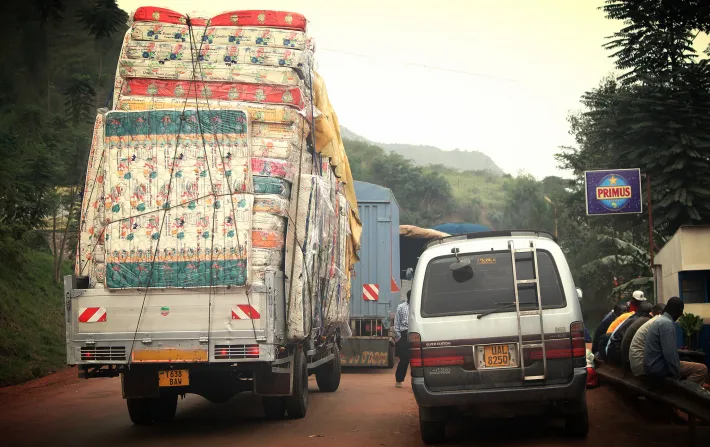
Perspectives May 13, 2016
Africa’s Next Chapter: Driving Growth through Rule of Law and Transparency
Businesses want predictable and transparent government regulation, the ability to operate freely, and fair enforcement of the law. Investment goes where it is welcome and stays where it is treated well.

Truck with mattresses in the queue for customs clearance at border crossing from Rwanda into Tanzania Credit: Syaolyao Cska, Flickr.
by Daniel Calingaert, Acting President, Freedom House
Leslie Griffin, Senior Vice President for International Public Policy, UPS
Government, business, and civil society leaders came to Kigali, Rwanda, this week to discuss topics ranging from trade facilitation to the digital revolution at the World Economic Forum on Africa. Today, the continent’s potential for growth lies less in resource extraction, and more in intra-Africa trade and participation in global value chains. Particularly at a time of low commodity prices, the future of African economies depends on the continent’s ability to improve local business environments and facilitate the free flow of commerce and investment across its borders.
To achieve those economic gains and attract greater foreign investment, Africa needs to set a new tone that is compelling for the kinds of companies it wishes to attract. The incentive here doesn’t have to be monetary; in fact, the best incentive would be something much more fundamental. Businesses want predictable and transparent government regulation, the ability to operate freely, and fair enforcement of the law. Investment goes where it is welcome and stays where it is treated well.
In the past, this kind of fair and transparent government regulation has often not been the hallmark of African economies. That means investment today in African countries often comes with unanticipated challenges, legal difficulties, and costly complexity. Simply put, the connection between the rule of law and the ease of doing business in Sub-Saharan Africa is powerful. In countries where adherence to the rule of law is strong, the regulatory environment usually is more conducive to starting and operating businesses, while weak rule of law tends to stifle business activity.
A comparison of World Bank data and Freedom House’s Freedom in the World ratings illustrates this point vividly. The ease of doing business increases significantly with greater adherence to the rule of law (shown in the graph below as average scores for African countries in the Freedom House categories of “not free” in purple, “partly free” in yellow, and “free” in green).
Real-world examples from companies investing in Africa tell a similar story.
Take UPS, a company with vast experience doing business internationally. Today, it’s one of the world’s largest package delivery companies, and a leading provider of specialized transportation and logistics services. UPS’s package cars, trailers, planes, and sea containers move approximately 2 percent of global GDP in more than 220 countries and territories. Knowing that as the global economy grows, so does delivery volume, UPS has a vested interest in seeing the African economy grow. The more trade there is, the more goods move through the UPS network, and so UPS has every reason to want African economies to attract investment and become more hospitable to global commerce.
As African governments work to reduce their reliance on agriculture and natural resources and grow their commercial sectors, UPS is seeing segments like healthcare and retail start to blossom. With the growth of the middle class also comes a greater need for information technology, an automotive sector, machinery and parts, consumer electronics, and new sources of energy. All of these segments are important customer verticals for UPS.
Today, UPS has operations in 51 African countries, largely utilizing local agent relationships. Despite all the upside it sees on the continent, though, it only has two wholly owned operations—in South Africa and Morocco—two of the more stable and relatively transparent governments on the continent.
UPS, like many other companies, sees the opportunities to connect customers—both within Africa, and facilitating greater trade between African-owned businesses and the outside world. Rule of law deeply impacts whether those efforts will be successful. UPS—as a transportation provider—also sees one of the most physical and concrete manifestations of rule of law: At the border, at customs control.
Customs modernization is not only about new technology and more efficient processes, but about more transparent systems and more predictable enforcement of government regulations. Customs clearance at a border demonstrates how rule of law and governance begin to impact—and in this case, hinder—economic development.
Outmoded customs processes and difficulty doing business across borders in Africa impedes the development of a robust, scalable manufacturing sector in most countries. But predictable enforcement of border controls and more transparent policies could unlock some of those opportunities, creating jobs and stimulating middle-class growth. The difficult trading environment also keeps distribution costs high, impeding the growth of local start-ups and businesses looking to reach outside consumers. Technological advances like the internet and logistics enterprises like UPS give so much potential power to African businesses—but only if they can actually get their products to buyers.
Much attention in recent years has been given to Africa’s need for hard infrastructure, like roads, water, and electricity. But to truly capitalize on today’s global opportunities, we must also begin to consider soft infrastructure—government policies and actions that dictate what’s possible. Setting the bar higher should be an imperative driven by the whole continent—not just a few select countries.
Truly, Africa is on the verge of a dramatic and powerful transformation that has the potential to engender incredible quality of life gains, economic expansion, and the rise of a true middle class. But international companies, African governments, and everyday citizens must work together to create real change rooted in Africa itself. The power to attract investment and grow economies can be harnessed, but only if rule of law is more widely adopted by the governments across Africa.